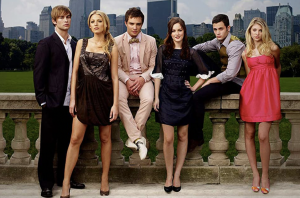Queer, although multifaceted in its definition, is primarily used in the LGBTQ+ community as an umbrella term for those whose sexual and gender identities are not cisgender or heterosexual. Queer media, which promotes the fluid nature of queerness, has become increasingly more prominent on various platforms such as television, streaming services, film, and social media. Promoting queer culture through various media platforms has allowed for numerous people with underrepresented identities to express themselves confidently and challenge traditional cultural/societal norms. The rise of queer media is especially apparent through several pre-existing and recent shows on streaming platforms such as Netflix, Hulu, Amazon, and HBO Max. An example of queer media that I’ve enjoyed is HBO Max’s reboot of the show Gossip Girl (2007). Although the original show’s characters were almost exclusively white and heterosexual, the 2021 reboot has challenged this completely. Firstly, the style of the characters is incredibly bold. As a review of the show on the website Queer Queue states about the protagonist, “…Alexander’s Julien is a revelation of a character. The fluid style that feels truly inspired by herself is a breath of fresh air from all of the stuffy couture we’re used to. There’s a queerness to her style…” Her style is bold and edgy, and her work as a social media influencer showcases how the lifestyle and perception of New York City’s elite has changed immensely since the original show aired. Another example of the show’s fostering of queer culture, is the inclusion of a pansexual character, Max Wolfe. Chuck Bass, a character from the 2007 cast, was well known as a womaniser. Although the reboot’s character’s aren’t meant to be the same (more so reflections of characters from the original show) the new “Chuck Bass” character named “Max Wolfe” shows interest in men, women, and gender fluid partners. Although he possesses the same “drive” as the original Chuck Bass, he has his sights set on a much greater variety of people than just the heterosexual women of New York City’s elite. Critics of queer media applaud the fluidity and “queerness” of the show, acknowledging the value in the realism of the diversity in race, sexual orientation, and gender of the characters.
Original Cast (2007)

Reboot Cast (2021)

Queer Queue article:
https://thequeerqueue.com/hbo-maxs-gossip-girl-reboot-hot-take/

I agree that the representation of these queer identities is important. This is especially relevant in the example you mentioned, the 2021 reboot of Gossip Girl, since it includes characters who have even more diverse identities, being people of color who also identify as queer. Something that is often overlooked in queer media is the importance of representing intersectional queer identities on screen. As media consumers, we become more comfortable with what we see more often, which is why it is important to introduce various queer identities in media. I think that sometimes television can include a white gay male couple just for the sake of “queer representation”, but oftentimes this doesn’t do enough to challenge our ways of thinking and considering a wider range of queer identities.
Media has such a large impact on our society, so I agree that queer representation in the media has allowed people to express themselves more freely and confidently and challenge traditional norms. I really liked the Gossip Girl and Gossip Girl Reboot comparison example. I’ve watched both of these shows and noticed the differences that you noted, especially about fashion and sexual orientation. Julien, particularly, contrasts Serena as a mixed person with a shaved head and fluid fashion. I think the difference in representation from the original versus the reboot underscores the progress our society has made with the acceptance and normalization of queerness from 2007 to now.